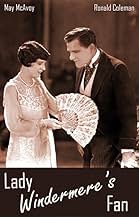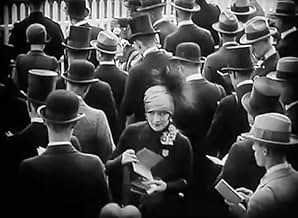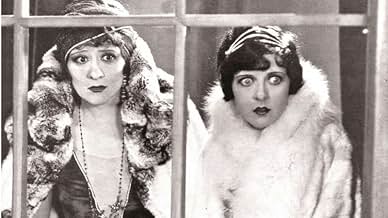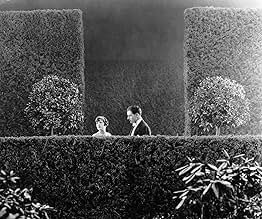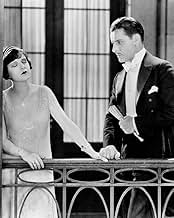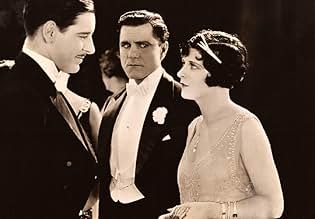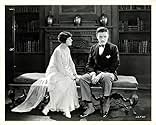CALIFICACIÓN DE IMDb
7.2/10
1.5 k
TU CALIFICACIÓN
Agrega una trama en tu idiomaA society woman believes her husband is having an affair, a misconception which may have dire personal consequences for all involved.A society woman believes her husband is having an affair, a misconception which may have dire personal consequences for all involved.A society woman believes her husband is having an affair, a misconception which may have dire personal consequences for all involved.
- Dirección
- Guionistas
- Elenco
- Premios
- 1 premio ganado en total
Edward Martindel
- Lord Augustus Lorton
- (as Edw. Martindel)
Carrie Daumery
- The Duchess of Berwick
- (as Mme. Daumery)
Billie Bennett
- Lady Plymdale
- (sin créditos)
Michael Dark
- Party Guest
- (sin créditos)
Helen Dunbar
- Mrs. Cowper-Cowper
- (sin créditos)
Frank Finch Smiles
- Waiter with Party Guest List
- (sin créditos)
Larry Steers
- Party Guest
- (sin créditos)
Ellinor Vanderveer
- Party Guest
- (sin créditos)
Percy Williams
- Waiter at the Party
- (sin créditos)
Opiniones destacadas
Ernst Lubitsch was a great director with many wonderful films, his early work (his German silents) is more interesting than great but when he hit his stride from the late-20s onwards his very distinctive directing style sparkled at its best. Oscar Wilde was a tremendously influential, perceptive and subversive writer, his work having much drollness and bite. Have for a long time appreciated silent films highly, while there are ones that don't hold up the ones that have are very good and the best landmarks.
'Lady Windermere's Fan' is an interesting Wilde play. It is not one of my favourite works of his, 'The Importance of Being Ernest', 'The Selfish Giant' and 'The Picture of Dorian Grey' connect with me more and am more familiar with them too, but it is unmistakably Wilde in characterisation and prose. This 1925 film adaptation is great on its own terms and even if Lubitsch went on to do even better later 'Lady Windermere's Fan' is by far one of his best and most interesting silent films (and to me one of his first great films).
Don't expect a film that is one hundred percent faithful to the source material. As said, there is a lot of heavy re-working. Not that that is a bad thing, it makes no difference to me actually, but it is merely a word of warning for anybody that thinks the opposite. It also feels more Lubitsch than Wilde, which is not necessarily a bad thing. Absolutely love Lubitsch's directing style, very much in full display, which is full of wit, sophistication and irony.
While Wilde's typically perceptive depiction of humanity and its nature and the insightful approach to his characters remain, there isn't quite enough of his own wit and subversiveness. There is absolutely evidence of them and the two styles generally don't clash surprisingly, but Lubitsch's directing makes more of a splash here.
Visually, 'Lady Windermere's Fan' looks great. Very sumptuously designed and costumed and there are some stylish shots that are expansive enough to avoid it from feeling too much of a filmed play or too claustrophobic. Lubitsch's direction is clever and elegant throughout, no rough around the edges feel or any signs of disinterest. It is very well performed and with more subtlety than a fair share of silent films from this period, with the best performance coming from Irene Rich as the most interesting character. She really does lighten up the screen.
All the conflicts are done with tension but also in a witty and sophisticated fashion, and the actors interact very naturally, no stiffness or disconnection here. The story is fun and charming, any harshness in the conflict done with bite and nuance. It goes at a lively enough pace, helped by that Lubitsch doesn't take the material too seriously, and doesn't get bogged down by staginess or over-reliance on anything that could potentially deaden the pace (i.e. title cards). The characters are interesting and Wilde's perceptive approach towards them is maintained.
On the whole, great. 9/10
'Lady Windermere's Fan' is an interesting Wilde play. It is not one of my favourite works of his, 'The Importance of Being Ernest', 'The Selfish Giant' and 'The Picture of Dorian Grey' connect with me more and am more familiar with them too, but it is unmistakably Wilde in characterisation and prose. This 1925 film adaptation is great on its own terms and even if Lubitsch went on to do even better later 'Lady Windermere's Fan' is by far one of his best and most interesting silent films (and to me one of his first great films).
Don't expect a film that is one hundred percent faithful to the source material. As said, there is a lot of heavy re-working. Not that that is a bad thing, it makes no difference to me actually, but it is merely a word of warning for anybody that thinks the opposite. It also feels more Lubitsch than Wilde, which is not necessarily a bad thing. Absolutely love Lubitsch's directing style, very much in full display, which is full of wit, sophistication and irony.
While Wilde's typically perceptive depiction of humanity and its nature and the insightful approach to his characters remain, there isn't quite enough of his own wit and subversiveness. There is absolutely evidence of them and the two styles generally don't clash surprisingly, but Lubitsch's directing makes more of a splash here.
Visually, 'Lady Windermere's Fan' looks great. Very sumptuously designed and costumed and there are some stylish shots that are expansive enough to avoid it from feeling too much of a filmed play or too claustrophobic. Lubitsch's direction is clever and elegant throughout, no rough around the edges feel or any signs of disinterest. It is very well performed and with more subtlety than a fair share of silent films from this period, with the best performance coming from Irene Rich as the most interesting character. She really does lighten up the screen.
All the conflicts are done with tension but also in a witty and sophisticated fashion, and the actors interact very naturally, no stiffness or disconnection here. The story is fun and charming, any harshness in the conflict done with bite and nuance. It goes at a lively enough pace, helped by that Lubitsch doesn't take the material too seriously, and doesn't get bogged down by staginess or over-reliance on anything that could potentially deaden the pace (i.e. title cards). The characters are interesting and Wilde's perceptive approach towards them is maintained.
On the whole, great. 9/10
I agree with the other reviewers that Lubitsch did a great job reworking parts of Wilde's play to make it suitable for silent film, and adding some of his signature touches. But I don't think the movie stands up to some of his later pieces, such as "Trouble in Paradise" and "Design for Living" (also reworked from a famous play, to good advantage). "Lady Windermere's Fan" is much more slow-paced, which can make it hard for a modern viewer, and not all of the characters are as interesting. However, the performances are good, especially the marvelous Irene Rich (whose high-fashion costumes are endlessly entertaining), the production values are high, and if you have the patience, you will be rewarded with some nice little bits of Lubitsch's social observation. It's interesting to consider how drastically attitudes toward male-female relations have changed over the decades: the film's plot depends on beliefs that have mostly, and rightfully, vanished. In contrast to convention, Lubitsch obviously enjoyed helping Rich create an older woman who was fascinating and sexually powerful.
'Lady Windermere's Fan' is one of the great plays of Oscar Wilde, so it is curious to see it here as a big budget silent film from Warners Brothers. Starring May McAvoy and Bert Lytell as the Windermeres, with Irene Rich as Mrs Erlynne and a young Ronald Colman as Lord Darlington, this film is directed by Ernst Lubitsch, known mainly now for his stylish musicals and dramas from the sound era.
Despite the obvious drawback of not using any of Wilde's text, either spoken or as title cards, this adaptation does succeed in putting across most of the play's plot, just making a little tweak here and there to move the plot along or to bring matters to a satisfactory conclusion. Sets and costumes are of the jazz age and are beautiful, and McAvoy is a winsome Lady Windermere, all indignant eyes and little rosebud mouth.
The film however belongs to Irene Rich who portrays Mrs Erlynne as desperate, calculating, and everything in-between. She was a superb technician without overacting, and it's a pleasure to watch her. Ronald Colman as well shows signs of the star quality to come.
This 'Lady Windermere' is well worth watching.
Despite the obvious drawback of not using any of Wilde's text, either spoken or as title cards, this adaptation does succeed in putting across most of the play's plot, just making a little tweak here and there to move the plot along or to bring matters to a satisfactory conclusion. Sets and costumes are of the jazz age and are beautiful, and McAvoy is a winsome Lady Windermere, all indignant eyes and little rosebud mouth.
The film however belongs to Irene Rich who portrays Mrs Erlynne as desperate, calculating, and everything in-between. She was a superb technician without overacting, and it's a pleasure to watch her. Ronald Colman as well shows signs of the star quality to come.
This 'Lady Windermere' is well worth watching.
An epigram-less silent screen version of Oscar Wilde by Ernst Lubitsch is likely to be a contest rather than a collaboration (and not surprisingly Lubitsch wins).
Irene Rich's handsome profile in the role of Mrs Erlynne provides a sight to savour throughout, and the race meet at which we see her from constantly switching viewpoints as people study her through their binoculars is one of the visual & cinematic highlights of the film.
Irene Rich's handsome profile in the role of Mrs Erlynne provides a sight to savour throughout, and the race meet at which we see her from constantly switching viewpoints as people study her through their binoculars is one of the visual & cinematic highlights of the film.
When a stage play is turned into a movie the results can be dire, especially when the play is a dialog-driven comedy of manners, full of quips and epigrams. Unless it's handled carefully even a great play might come off as 'canned' and lifeless on screen, amounting to little more than what Alfred Hitchcock dismissed as "photographs of people talking." A few exceptions come to mind: The Philadelphia Story, the two versions of Holiday made in the '30s, the Rex Harrison/Margaret Rutherford Blithe Spirit, and a handful of other stage-to-screen adaptations that manage to be lively and entertaining despite heavy reliance on dialog. But these films are surpassed in achievement, in one sense at least, by an adaptation from 1925 which perfectly captures the spirit of the play it presents while scarcely quoting it!
Before seeing Ernst Lubitsch's silent version of Lady Windermere's Fan at the Museum of Modern Art this summer I re-read Oscar Wilde's play, which I enjoyed, but I didn't have high hopes for the movie, despite the involvement of a director I count among my favorites. I imagined the movie would consist of actors standing around in tuxes and evening gowns pretending to mouth witty sayings, which would then be presented to us in numerous title cards; but because I admire Lubitsch's sound films a great deal I thought I'd give it a try. Plus, I thought it'd be interesting to see Ronald Colman in a silent film, deprived of that wonderful voice. What a pleasant surprise to find that this is one of the best sophisticated comedies of the silent screen. The flavor of Wilde's play is distilled to its essence, and clearly conveyed without relying on a single one of his famous epigrams. (Interestingly, a recent biography of Lubitsch says that the film quotes only two or three lines from the play, but if so I didn't catch them.) How is this possible?
Lubitsch conveys Wilde's notions about high society swells and their prejudices cinematically, not verbally. When the notorious Mrs. Erlynne (Irene Rich) appears at the Ascot race track, the reaction of "society" is quickly made clear to us by the scandalized facial expressions of the ladies present; who, nonetheless, can't stop looking at her or talking about her. The tone of their remarks is obvious from their sour expressions. Naturally, the men are interested in Mrs. Erlynne, too. She is shown, montage fashion, from many different angles, through lorgnettes and binoculars, long-shot, extreme long-shot and close-up, and while the horse race is reduced to mere background. It's a funny and informative sequence, yet it isn't in Wilde's play at all. In another scene that more closely follows the text, Lord Darlington (Colman) calls on Lord and Lady Windermere at their home. He is formally announced, and pretends briefly that he actually came to see Lord Windermere on some minor matter. But when Windermere conveniently leaves on business, Darlington, shown in a stately long-shot, strides away from Lady Windermere (May McAvoy), sits, shoots her a sly look, and announces that he is in love with her. Shocked, she crosses and drops into a chair next to him. He rises, crosses away from her, and drops into a different chair. They both look miserable. Fade-out. It's a beautifully staged scene, and no additional dialog is necessary.
Another sequence that occurs late in the film perfectly epitomizes the famous Lubitsch Touch while deftly conveying the spirit of Wilde's play: a title card announces that "The relations between a man and a woman can be told by the way he presses her doorbell." Various ways in which this is so are then demonstrated. You wouldn't think that a close-up shot of a doorbell and a gentleman's gloved hand could be so suggestive, but Lubitsch manages to suggest a great deal.
The black & white cinematography of Lady Windermere's Fan positively shimmers; happily, this is one silent film that has been well preserved. The acting is quite restrained by the standards of the day, and even without his voice Ronald Colman has the presence of a star, while Irene Rich gives the performance of her career. It's a wonderful adaptation of a great play that can stand on its own as cinema; and it may come as a surprise to those who believe silent film comedy begins and ends with Ben Turpin and the Keystone Cops.
Before seeing Ernst Lubitsch's silent version of Lady Windermere's Fan at the Museum of Modern Art this summer I re-read Oscar Wilde's play, which I enjoyed, but I didn't have high hopes for the movie, despite the involvement of a director I count among my favorites. I imagined the movie would consist of actors standing around in tuxes and evening gowns pretending to mouth witty sayings, which would then be presented to us in numerous title cards; but because I admire Lubitsch's sound films a great deal I thought I'd give it a try. Plus, I thought it'd be interesting to see Ronald Colman in a silent film, deprived of that wonderful voice. What a pleasant surprise to find that this is one of the best sophisticated comedies of the silent screen. The flavor of Wilde's play is distilled to its essence, and clearly conveyed without relying on a single one of his famous epigrams. (Interestingly, a recent biography of Lubitsch says that the film quotes only two or three lines from the play, but if so I didn't catch them.) How is this possible?
Lubitsch conveys Wilde's notions about high society swells and their prejudices cinematically, not verbally. When the notorious Mrs. Erlynne (Irene Rich) appears at the Ascot race track, the reaction of "society" is quickly made clear to us by the scandalized facial expressions of the ladies present; who, nonetheless, can't stop looking at her or talking about her. The tone of their remarks is obvious from their sour expressions. Naturally, the men are interested in Mrs. Erlynne, too. She is shown, montage fashion, from many different angles, through lorgnettes and binoculars, long-shot, extreme long-shot and close-up, and while the horse race is reduced to mere background. It's a funny and informative sequence, yet it isn't in Wilde's play at all. In another scene that more closely follows the text, Lord Darlington (Colman) calls on Lord and Lady Windermere at their home. He is formally announced, and pretends briefly that he actually came to see Lord Windermere on some minor matter. But when Windermere conveniently leaves on business, Darlington, shown in a stately long-shot, strides away from Lady Windermere (May McAvoy), sits, shoots her a sly look, and announces that he is in love with her. Shocked, she crosses and drops into a chair next to him. He rises, crosses away from her, and drops into a different chair. They both look miserable. Fade-out. It's a beautifully staged scene, and no additional dialog is necessary.
Another sequence that occurs late in the film perfectly epitomizes the famous Lubitsch Touch while deftly conveying the spirit of Wilde's play: a title card announces that "The relations between a man and a woman can be told by the way he presses her doorbell." Various ways in which this is so are then demonstrated. You wouldn't think that a close-up shot of a doorbell and a gentleman's gloved hand could be so suggestive, but Lubitsch manages to suggest a great deal.
The black & white cinematography of Lady Windermere's Fan positively shimmers; happily, this is one silent film that has been well preserved. The acting is quite restrained by the standards of the day, and even without his voice Ronald Colman has the presence of a star, while Irene Rich gives the performance of her career. It's a wonderful adaptation of a great play that can stand on its own as cinema; and it may come as a surprise to those who believe silent film comedy begins and ends with Ben Turpin and the Keystone Cops.
¿Sabías que…?
- TriviaOne of the 50 films in the three-disk boxed DVD set called "More Treasures from American Film Archives, 1894-1931" (2004), compiled by the National Film Preservation Foundation from five American film archives. This film is preserved by the Museum of Modern Art, has a running time of 89 minutes and an added piano music score.
- Citas
Opening title card: Lady Windermere faced the grave problem of seating her dinner guests.
- ConexionesFeatured in Historia del cine: Epoca muda (1983)
Selecciones populares
Inicia sesión para calificar y agrega a la lista de videos para obtener recomendaciones personalizadas
- How long is Lady Windermere's Fan?Con tecnología de Alexa
Detalles
- Fecha de lanzamiento
- País de origen
- Idioma
- También se conoce como
- Tajna ledi Vindermir
- Locaciones de filmación
- Toronto, Ontario, Canadá(Racetrack Scene)
- Productora
- Ver más créditos de la compañía en IMDbPro
Taquilla
- Presupuesto
- USD 320,000 (estimado)
- Tiempo de ejecución2 horas
- Mezcla de sonido
- Relación de aspecto
- 1.33 : 1
Contribuir a esta página
Sugiere una edición o agrega el contenido que falta

Principales brechas de datos
By what name was Lady Windermere's Fan (1925) officially released in Canada in English?
Responda
